专题04 方位介词和不定代词【弯道超车】暑假新八年级英语 语法知识点讲解+例题精炼(牛津译林版)
文档属性
| 名称 | 专题04 方位介词和不定代词【弯道超车】暑假新八年级英语 语法知识点讲解+例题精炼(牛津译林版) |
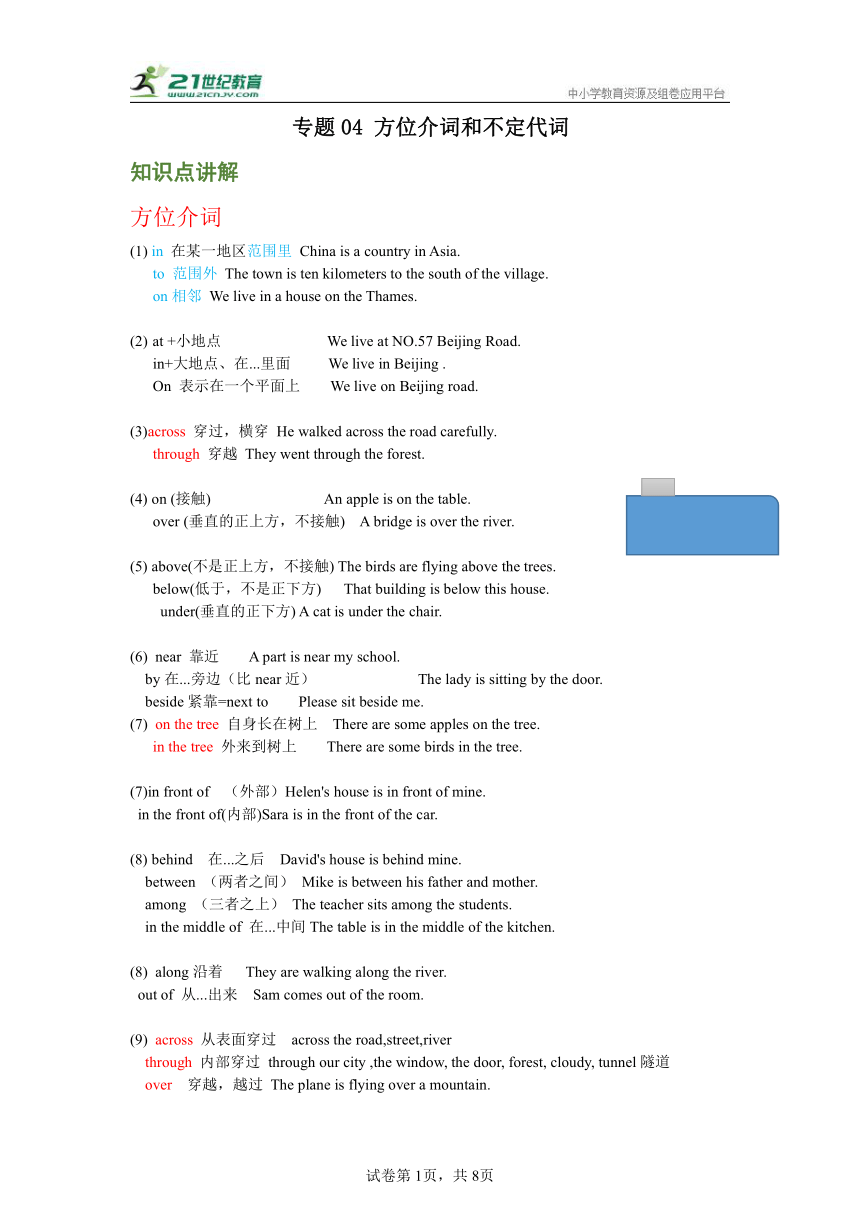
|
|
| 格式 | docx | ||
| 文件大小 | 72.6KB | ||
| 资源类型 | 试卷 | ||
| 版本资源 | 牛津译林版 | ||
| 科目 | 英语 | ||
| 更新时间 | 2024-07-13 21:23:56 | ||
图片预览

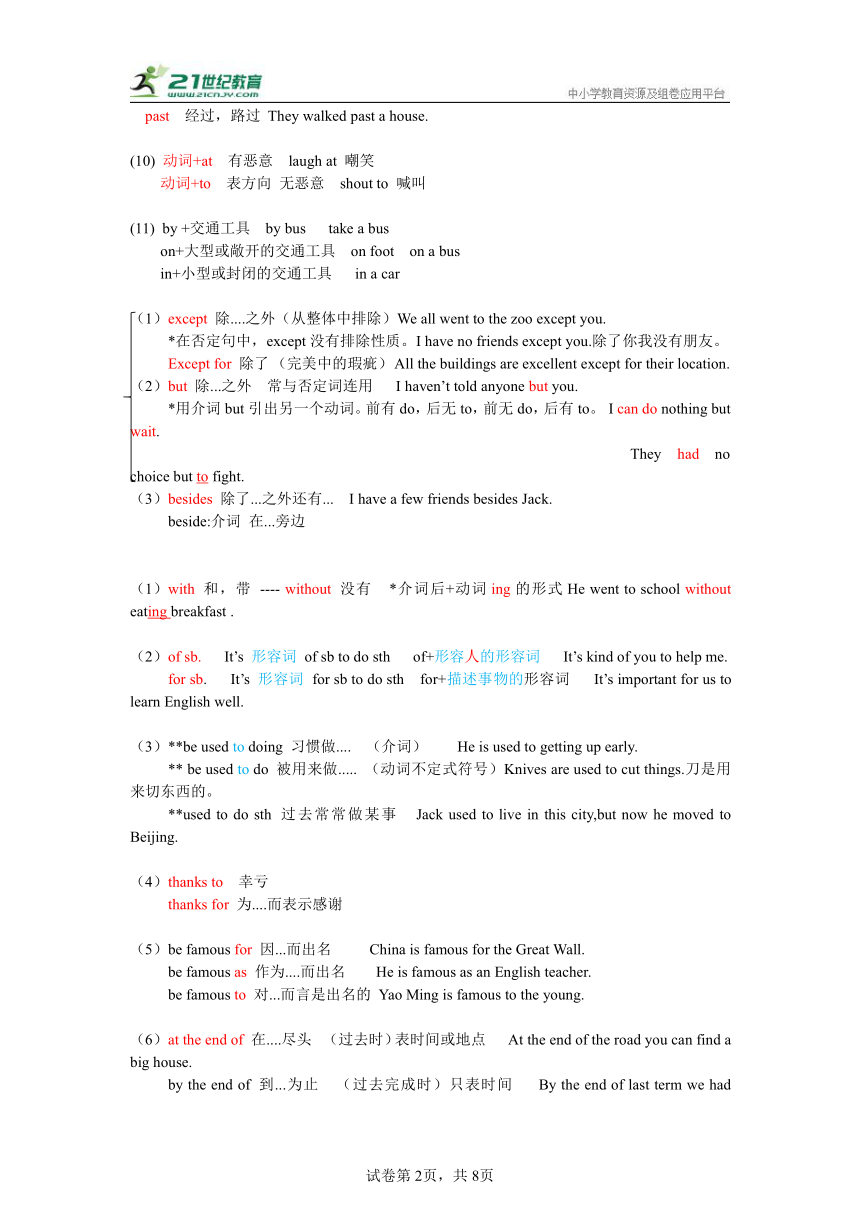
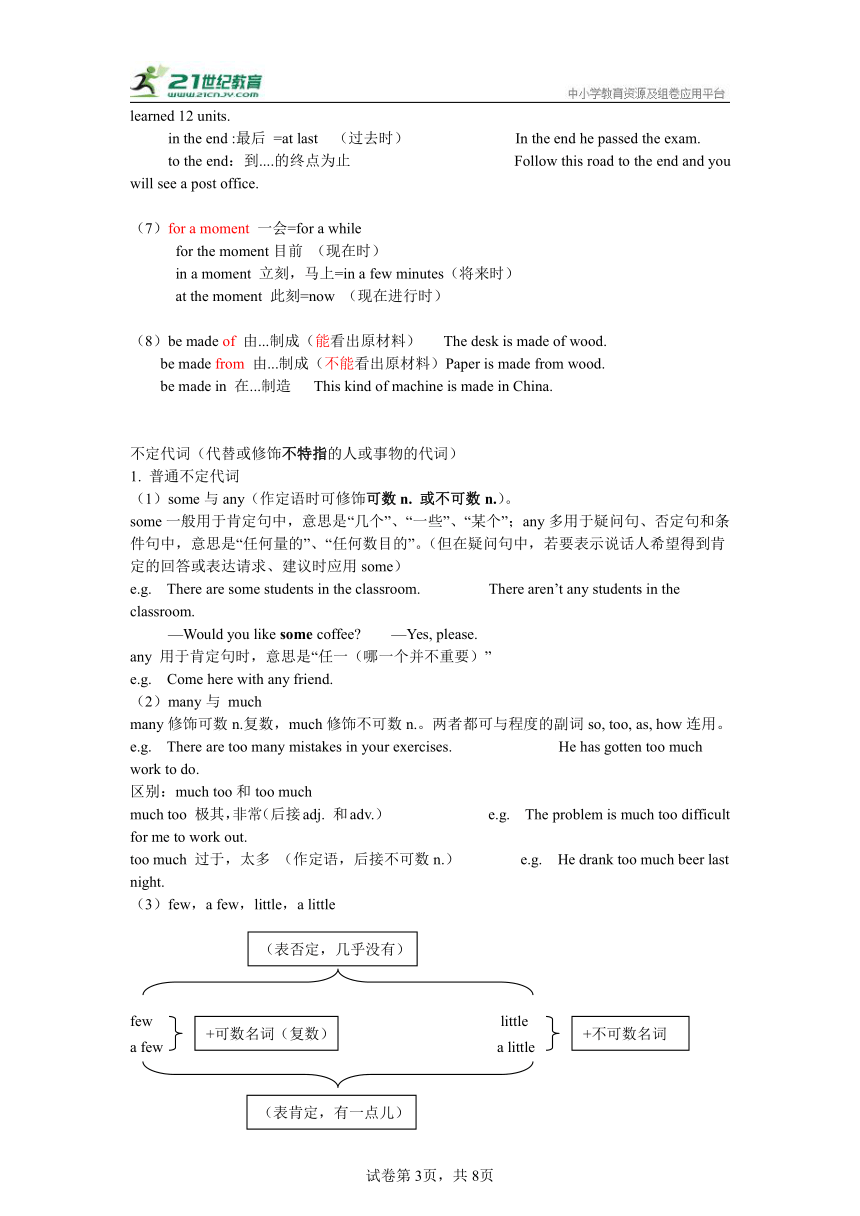
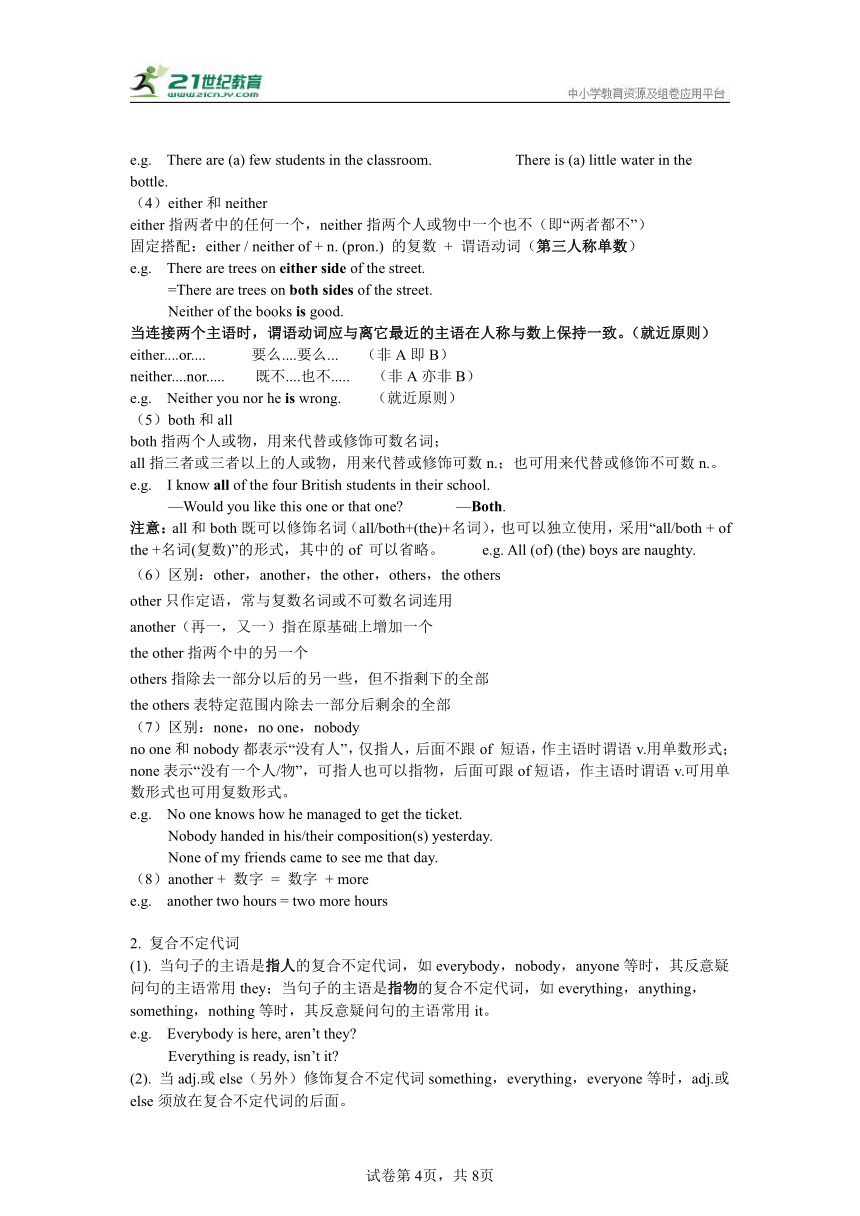
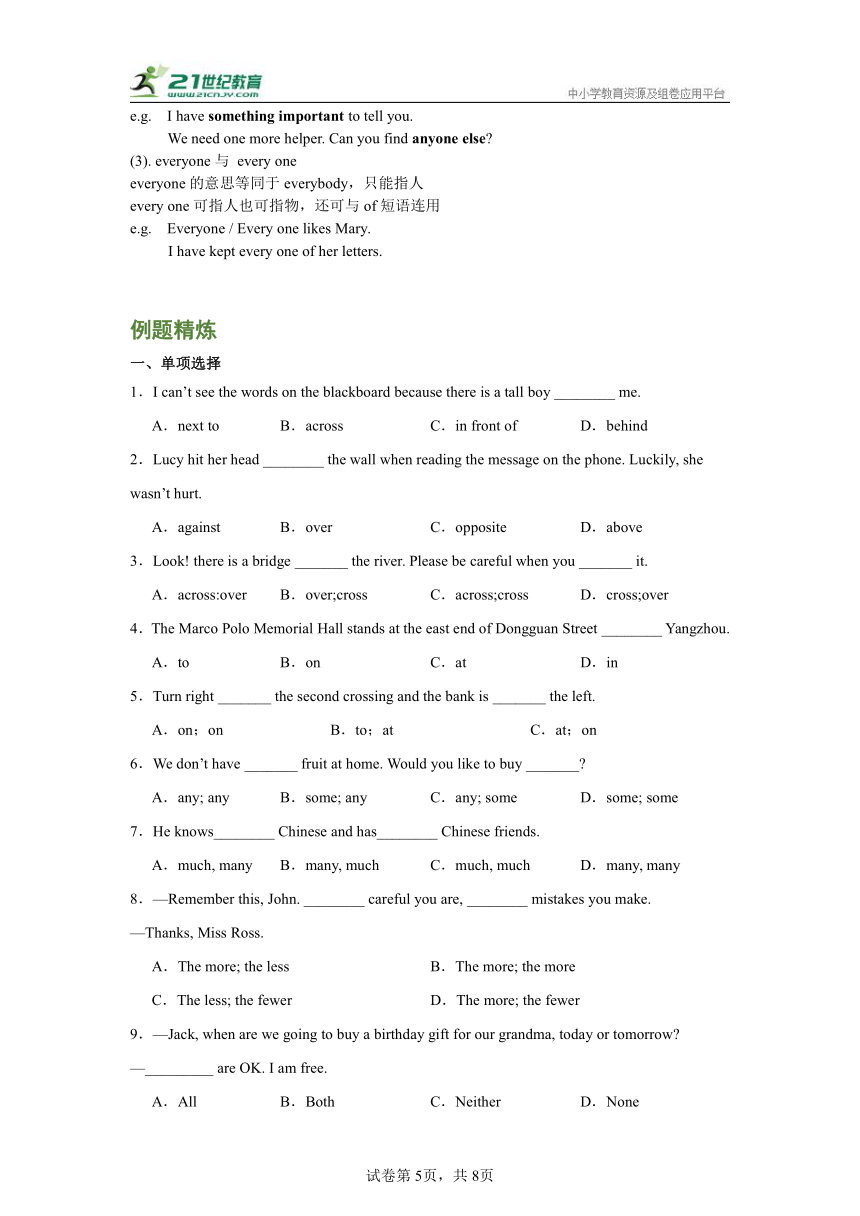
文档简介
专题04 方位介词和不定代词
知识点讲解
方位介词
(1) in 在某一地区范围里 China is a country in Asia.
to 范围外 The town is ten kilometers to the south of the village.
on相邻 We live in a house on the Thames.
at +小地点 We live at NO.57 Beijing Road.
in+大地点、在...里面 We live in Beijing .
On 表示在一个平面上 We live on Beijing road.
(3)across 穿过,横穿 He walked across the road carefully.
through 穿越 They went through the forest.
(4) on (接触) An apple is on the table.
over (垂直的正上方,不接触) A bridge is over the river.
(5) above(不是正上方,不接触) The birds are flying above the trees.
below(低于,不是正下方) That building is below this house.
under(垂直的正下方) A cat is under the chair.
near 靠近 A part is near my school.
by在...旁边(比near近) The lady is sitting by the door.
beside紧靠=next to Please sit beside me.
on the tree 自身长在树上 There are some apples on the tree.
in the tree 外来到树上 There are some birds in the tree.
(7)in front of (外部)Helen's house is in front of mine.
in the front of(内部)Sara is in the front of the car.
(8) behind 在...之后 David's house is behind mine.
between (两者之间) Mike is between his father and mother.
among (三者之上) The teacher sits among the students.
in the middle of 在...中间The table is in the middle of the kitchen.
along沿着 They are walking along the river.
out of 从...出来 Sam comes out of the room.
across 从表面穿过 across the road,street,river
through 内部穿过 through our city ,the window, the door, forest, cloudy, tunnel隧道
over 穿越,越过 The plane is flying over a mountain.
past 经过,路过 They walked past a house.
动词+at 有恶意 laugh at 嘲笑
动词+to 表方向 无恶意 shout to 喊叫
by +交通工具 by bus take a bus
on+大型或敞开的交通工具 on foot on a bus
in+小型或封闭的交通工具 in a car
except 除....之外(从整体中排除)We all went to the zoo except you.
*在否定句中,except没有排除性质。I have no friends except you.除了你我没有朋友。
Except for 除了 (完美中的瑕疵) All the buildings are excellent except for their location.
but 除...之外 常与否定词连用 I haven’t told anyone but you.
*用介词but引出另一个动词。前有do,后无to,前无do,后有to。 I can do nothing but wait.
They had no choice but to fight.
besides 除了...之外还有... I have a few friends besides Jack.
beside:介词 在...旁边
with 和,带 ---- without 没有 *介词后+动词ing的形式He went to school without eating breakfast .
of sb. It’s 形容词 of sb to do sth of+形容人的形容词 It’s kind of you to help me.
for sb. It’s 形容词 for sb to do sth for+描述事物的形容词 It’s important for us to learn English well.
**be used to doing 习惯做.... (介词) He is used to getting up early.
** be used to do 被用来做..... (动词不定式符号)Knives are used to cut things.刀是用来切东西的。
**used to do sth 过去常常做某事 Jack used to live in this city,but now he moved to Beijing.
thanks to 幸亏
thanks for 为....而表示感谢
be famous for 因...而出名 China is famous for the Great Wall.
be famous as 作为....而出名 He is famous as an English teacher.
be famous to 对...而言是出名的 Yao Ming is famous to the young.
at the end of 在....尽头 (过去时)表时间或地点 At the end of the road you can find a big house.
by the end of 到...为止 (过去完成时)只表时间 By the end of last term we had learned 12 units.
in the end :最后 =at last (过去时) In the end he passed the exam.
to the end:到....的终点为止 Follow this road to the end and you will see a post office.
for a moment 一会=for a while
for the moment目前 (现在时)
in a moment 立刻,马上=in a few minutes(将来时)
at the moment 此刻=now (现在进行时)
be made of 由...制成(能看出原材料) The desk is made of wood.
be made from 由...制成(不能看出原材料)Paper is made from wood.
be made in 在...制造 This kind of machine is made in China.
不定代词(代替或修饰不特指的人或事物的代词)
1. 普通不定代词
(1)some与any(作定语时可修饰可数n. 或不可数n.)。
some一般用于肯定句中,意思是“几个”、“一些”、“某个”;any多用于疑问句、否定句和条件句中,意思是“任何量的”、“任何数目的”。(但在疑问句中,若要表示说话人希望得到肯定的回答或表达请求、建议时应用some)
e.g. There are some students in the classroom. There aren’t any students in the classroom.
—Would you like some coffee —Yes, please.
any 用于肯定句时,意思是“任一(哪一个并不重要)”
e.g. Come here with any friend.
(2)many与 much
many修饰可数n.复数,much修饰不可数n.。两者都可与程度的副词so, too, as, how连用。
e.g. There are too many mistakes in your exercises. He has gotten too much work to do.
区别:much too和too much
much too 极其,非常(后接adj. 和adv.) e.g. The problem is much too difficult for me to work out.
too much 过于,太多 (作定语,后接不可数n.) e.g. He drank too much beer last night.
(3)few,a few,little,a little
few little
a few a little
e.g. There are (a) few students in the classroom. There is (a) little water in the bottle.
(4)either和neither
either指两者中的任何一个,neither指两个人或物中一个也不(即“两者都不”)
固定搭配:either / neither of + n. (pron.) 的复数 + 谓语动词(第三人称单数)
e.g. There are trees on either side of the street.
=There are trees on both sides of the street.
Neither of the books is good.
当连接两个主语时,谓语动词应与离它最近的主语在人称与数上保持一致。(就近原则)
either....or.... 要么....要么... (非A即B)
neither....nor..... 既不....也不..... (非A亦非B)
e.g. Neither you nor he is wrong. (就近原则)
both和all
both指两个人或物,用来代替或修饰可数名词;
all指三者或三者以上的人或物,用来代替或修饰可数n.;也可用来代替或修饰不可数n.。
e.g. I know all of the four British students in their school.
—Would you like this one or that one —Both.
注意:all和both既可以修饰名词(all/both+(the)+名词),也可以独立使用,采用“all/both + of the +名词(复数)”的形式,其中的of 可以省略。 e.g. All (of) (the) boys are naughty.
(6)区别:other,another,the other,others,the others
other只作定语,常与复数名词或不可数名词连用
another(再一,又一)指在原基础上增加一个
the other指两个中的另一个
others指除去一部分以后的另一些,但不指剩下的全部
the others表特定范围内除去一部分后剩余的全部
区别:none,no one,nobody
no one和nobody都表示“没有人”,仅指人,后面不跟of 短语,作主语时谓语v.用单数形式;
none表示“没有一个人/物”,可指人也可以指物,后面可跟of短语,作主语时谓语v.可用单数形式也可用复数形式。
e.g. No one knows how he managed to get the ticket.
Nobody handed in his/their composition(s) yesterday.
None of my friends came to see me that day.
(8)another + 数字 = 数字 + more
e.g. another two hours = two more hours
2. 复合不定代词
. 当句子的主语是指人的复合不定代词,如everybody,nobody,anyone等时,其反意疑问句的主语常用they;当句子的主语是指物的复合不定代词,如everything,anything,something,nothing等时,其反意疑问句的主语常用it。
e.g. Everybody is here, aren’t they
Everything is ready, isn’t it
. 当adj.或else(另外)修饰复合不定代词something,everything,everyone等时,adj.或else须放在复合不定代词的后面。
e.g. I have something important to tell you.
We need one more helper. Can you find anyone else
. everyone与 every one
everyone的意思等同于everybody,只能指人
every one可指人也可指物,还可与of短语连用
e.g. Everyone / Every one likes Mary.
I have kept every one of her letters.
例题精炼
一、单项选择
1.I can’t see the words on the blackboard because there is a tall boy ________ me.
A.next to B.across C.in front of D.behind
2.Lucy hit her head ________ the wall when reading the message on the phone. Luckily, she wasn’t hurt.
A.against B.over C.opposite D.above
3.Look! there is a bridge _______ the river. Please be careful when you _______ it.
A.across:over B.over;cross C.across;cross D.cross;over
4.The Marco Polo Memorial Hall stands at the east end of Dongguan Street ________ Yangzhou.
A.to B.on C.at D.in
5.Turn right _______ the second crossing and the bank is _______ the left.
A.on;on B.to;at C.at;on
6.We don’t have _______ fruit at home. Would you like to buy _______
A.any; any B.some; any C.any; some D.some; some
7.He knows________ Chinese and has________ Chinese friends.
A.much, many B.many, much C.much, much D.many, many
8.—Remember this, John. ________ careful you are, ________ mistakes you make.
—Thanks, Miss Ross.
A.The more; the less B.The more; the more
C.The less; the fewer D.The more; the fewer
9.—Jack, when are we going to buy a birthday gift for our grandma, today or tomorrow
—_________ are OK. I am free.
A.All B.Both C.Neither D.None
10.Little Tom stuck a tiny red flag on ________ side of his face to celebrate his victory.
A.both B.every C.each D.any
11.—Would you like to watch TV or listen to music this Sunday
—________. I want to go out to play basketball.
A.Either B.Both C.None D.Neither
12.It was a terrible accident. One passenger was killed, and ________ was badly hurt.
A.the others B.the other C.others D.the rest
13.—Becky, I want to read a book about how to learn English well. Do you have ________
—No, I don’t. You can ask Mrs. He for help.
A.it B.that C.one
14.—Hey, David. _________ is waiting for you at the school gate.
—It must be Andy, my brother.
A.Nobody B.Anybody C.Somebody D.Everybody
15.Boys and girls, believe in yourselves and never let ______ take away your dreams.
A.somebody B.anybody C.nobody D.everybody
16.—I heard that people in Paris stood in a long line to buy Chinese xiaolongbao.
—Yes, _________ could say no to it there.
A.everybody B.nobody C.somebody D.anybody
17.“________ is young once in their life. Now is the time for you to make the most of your youth.” President Xi Jinping said in his speech.
A.Nobody B.Somebody C.Everybody D.Nothing
18.—Can you hear the noise
—Yes, it’s from the washing machine. There’s ________ wrong with it. It’s just making usual sounds.
A.something B.anything C.nothing D.everything
19.Learn to smile. A smile costs ________, but gives so much.
A.nothing B.anything C.everything
20.—How much salt did you put in the soup
—I’m sorry to say, ________. I forgot.
A.no B.no one C.nothing D.none
二、完成句子
21.There are some flowers on the teachers’ desk.(改为一般疑问句)
flowers on the teachers’ desk
22.这道题太难了,没有几个人能解答出来。
The problem is .
23.父母和孩子们都在为更好的未来而努力。
parents their kids are working hard for a better future.
24.他们俩都没有时间陪我,因为他们工作很忙。
has time for me because of their busy work.
25.一些爱好令人放松,其他的很活跃。
Some hobbies are and are active.
26.someone, crying, I, hear, in, the, bedroom
.
27.This math problem is hard. Nobody can work it out. (合并为一句)
This math problem is too hard to work out.
28.Eddie speaks English best in his school. (同义句转换)
= else in his school speaks English as as Eddie.
29.老师告诉我们一些有趣的事情
The teacher told us .
30.你了解中国的历史吗?
Do you about Chinese history
31.冰箱里什么都没有。
There in the fridge.
32.我们万事俱备,等着新年到来。
We get the coming new year.
33.He left the room with nothing in his hand.(改为同义句)
He left the room in his hand.
三、单词拼写
34.I like to read (一些评论) before I watch the film.
35. (many) of the students have gone to the park and only three of them stay here.
36.For a few (秒), nobody said anything in the meeting.
37.N of the students wants to swim in the dirty river.
38.He gets up early e morning.
39.—The cake is delicious. Could I have a one
—Of course, you can. Help yourself, please.
40.I’ve got a few books about Chinese traditional medicine. of the books is interesting.
41.Betty, s is waiting for you outside the classroom.
42.If (任何人) wants to practice English, please give me a call.
43. (每人) has different ideas about the same thing.
44.I like cycling so much that there is n in the world that can bring me such pleasure.
45.It’s time to say goodbye, but n of us want to leave.
试卷第1页,共3页
试卷第1页,共3页
参考答案:
1.C
2.A
3.B
4.D
5.C
6.C
7.A
8.D
9.B
10.C
11.D
12.B
13.C
14.C
15.B
16.B
17.C
18.C
19.A
20.D
21. Are there any
22.so difficult that few people can work it out/so hard that few people can work it out
23. Both and
24. Neither of them
25. relaxing others
26.I hear someone crying in the bedroom
27. for anybody
28. Nobody well
29. something interesting
30. know anything
31. is nothing
32. everything ready for
33. without anything
34.some reviews
35.Most
36.seconds
37.(N)one
38.(e)very
39.(a)nother
40.Any/One/Each/None
41.(s)omeone/(s)omebody
42.anybody/anyone
43.Everybody/Everyone
44.(n)othing
45.(n)one
答案第1页,共2页
答案第1页,共2页
知识点讲解
方位介词
(1) in 在某一地区范围里 China is a country in Asia.
to 范围外 The town is ten kilometers to the south of the village.
on相邻 We live in a house on the Thames.
at +小地点 We live at NO.57 Beijing Road.
in+大地点、在...里面 We live in Beijing .
On 表示在一个平面上 We live on Beijing road.
(3)across 穿过,横穿 He walked across the road carefully.
through 穿越 They went through the forest.
(4) on (接触) An apple is on the table.
over (垂直的正上方,不接触) A bridge is over the river.
(5) above(不是正上方,不接触) The birds are flying above the trees.
below(低于,不是正下方) That building is below this house.
under(垂直的正下方) A cat is under the chair.
near 靠近 A part is near my school.
by在...旁边(比near近) The lady is sitting by the door.
beside紧靠=next to Please sit beside me.
on the tree 自身长在树上 There are some apples on the tree.
in the tree 外来到树上 There are some birds in the tree.
(7)in front of (外部)Helen's house is in front of mine.
in the front of(内部)Sara is in the front of the car.
(8) behind 在...之后 David's house is behind mine.
between (两者之间) Mike is between his father and mother.
among (三者之上) The teacher sits among the students.
in the middle of 在...中间The table is in the middle of the kitchen.
along沿着 They are walking along the river.
out of 从...出来 Sam comes out of the room.
across 从表面穿过 across the road,street,river
through 内部穿过 through our city ,the window, the door, forest, cloudy, tunnel隧道
over 穿越,越过 The plane is flying over a mountain.
past 经过,路过 They walked past a house.
动词+at 有恶意 laugh at 嘲笑
动词+to 表方向 无恶意 shout to 喊叫
by +交通工具 by bus take a bus
on+大型或敞开的交通工具 on foot on a bus
in+小型或封闭的交通工具 in a car
except 除....之外(从整体中排除)We all went to the zoo except you.
*在否定句中,except没有排除性质。I have no friends except you.除了你我没有朋友。
Except for 除了 (完美中的瑕疵) All the buildings are excellent except for their location.
but 除...之外 常与否定词连用 I haven’t told anyone but you.
*用介词but引出另一个动词。前有do,后无to,前无do,后有to。 I can do nothing but wait.
They had no choice but to fight.
besides 除了...之外还有... I have a few friends besides Jack.
beside:介词 在...旁边
with 和,带 ---- without 没有 *介词后+动词ing的形式He went to school without eating breakfast .
of sb. It’s 形容词 of sb to do sth of+形容人的形容词 It’s kind of you to help me.
for sb. It’s 形容词 for sb to do sth for+描述事物的形容词 It’s important for us to learn English well.
**be used to doing 习惯做.... (介词) He is used to getting up early.
** be used to do 被用来做..... (动词不定式符号)Knives are used to cut things.刀是用来切东西的。
**used to do sth 过去常常做某事 Jack used to live in this city,but now he moved to Beijing.
thanks to 幸亏
thanks for 为....而表示感谢
be famous for 因...而出名 China is famous for the Great Wall.
be famous as 作为....而出名 He is famous as an English teacher.
be famous to 对...而言是出名的 Yao Ming is famous to the young.
at the end of 在....尽头 (过去时)表时间或地点 At the end of the road you can find a big house.
by the end of 到...为止 (过去完成时)只表时间 By the end of last term we had learned 12 units.
in the end :最后 =at last (过去时) In the end he passed the exam.
to the end:到....的终点为止 Follow this road to the end and you will see a post office.
for a moment 一会=for a while
for the moment目前 (现在时)
in a moment 立刻,马上=in a few minutes(将来时)
at the moment 此刻=now (现在进行时)
be made of 由...制成(能看出原材料) The desk is made of wood.
be made from 由...制成(不能看出原材料)Paper is made from wood.
be made in 在...制造 This kind of machine is made in China.
不定代词(代替或修饰不特指的人或事物的代词)
1. 普通不定代词
(1)some与any(作定语时可修饰可数n. 或不可数n.)。
some一般用于肯定句中,意思是“几个”、“一些”、“某个”;any多用于疑问句、否定句和条件句中,意思是“任何量的”、“任何数目的”。(但在疑问句中,若要表示说话人希望得到肯定的回答或表达请求、建议时应用some)
e.g. There are some students in the classroom. There aren’t any students in the classroom.
—Would you like some coffee —Yes, please.
any 用于肯定句时,意思是“任一(哪一个并不重要)”
e.g. Come here with any friend.
(2)many与 much
many修饰可数n.复数,much修饰不可数n.。两者都可与程度的副词so, too, as, how连用。
e.g. There are too many mistakes in your exercises. He has gotten too much work to do.
区别:much too和too much
much too 极其,非常(后接adj. 和adv.) e.g. The problem is much too difficult for me to work out.
too much 过于,太多 (作定语,后接不可数n.) e.g. He drank too much beer last night.
(3)few,a few,little,a little
few little
a few a little
e.g. There are (a) few students in the classroom. There is (a) little water in the bottle.
(4)either和neither
either指两者中的任何一个,neither指两个人或物中一个也不(即“两者都不”)
固定搭配:either / neither of + n. (pron.) 的复数 + 谓语动词(第三人称单数)
e.g. There are trees on either side of the street.
=There are trees on both sides of the street.
Neither of the books is good.
当连接两个主语时,谓语动词应与离它最近的主语在人称与数上保持一致。(就近原则)
either....or.... 要么....要么... (非A即B)
neither....nor..... 既不....也不..... (非A亦非B)
e.g. Neither you nor he is wrong. (就近原则)
both和all
both指两个人或物,用来代替或修饰可数名词;
all指三者或三者以上的人或物,用来代替或修饰可数n.;也可用来代替或修饰不可数n.。
e.g. I know all of the four British students in their school.
—Would you like this one or that one —Both.
注意:all和both既可以修饰名词(all/both+(the)+名词),也可以独立使用,采用“all/both + of the +名词(复数)”的形式,其中的of 可以省略。 e.g. All (of) (the) boys are naughty.
(6)区别:other,another,the other,others,the others
other只作定语,常与复数名词或不可数名词连用
another(再一,又一)指在原基础上增加一个
the other指两个中的另一个
others指除去一部分以后的另一些,但不指剩下的全部
the others表特定范围内除去一部分后剩余的全部
区别:none,no one,nobody
no one和nobody都表示“没有人”,仅指人,后面不跟of 短语,作主语时谓语v.用单数形式;
none表示“没有一个人/物”,可指人也可以指物,后面可跟of短语,作主语时谓语v.可用单数形式也可用复数形式。
e.g. No one knows how he managed to get the ticket.
Nobody handed in his/their composition(s) yesterday.
None of my friends came to see me that day.
(8)another + 数字 = 数字 + more
e.g. another two hours = two more hours
2. 复合不定代词
. 当句子的主语是指人的复合不定代词,如everybody,nobody,anyone等时,其反意疑问句的主语常用they;当句子的主语是指物的复合不定代词,如everything,anything,something,nothing等时,其反意疑问句的主语常用it。
e.g. Everybody is here, aren’t they
Everything is ready, isn’t it
. 当adj.或else(另外)修饰复合不定代词something,everything,everyone等时,adj.或else须放在复合不定代词的后面。
e.g. I have something important to tell you.
We need one more helper. Can you find anyone else
. everyone与 every one
everyone的意思等同于everybody,只能指人
every one可指人也可指物,还可与of短语连用
e.g. Everyone / Every one likes Mary.
I have kept every one of her letters.
例题精炼
一、单项选择
1.I can’t see the words on the blackboard because there is a tall boy ________ me.
A.next to B.across C.in front of D.behind
2.Lucy hit her head ________ the wall when reading the message on the phone. Luckily, she wasn’t hurt.
A.against B.over C.opposite D.above
3.Look! there is a bridge _______ the river. Please be careful when you _______ it.
A.across:over B.over;cross C.across;cross D.cross;over
4.The Marco Polo Memorial Hall stands at the east end of Dongguan Street ________ Yangzhou.
A.to B.on C.at D.in
5.Turn right _______ the second crossing and the bank is _______ the left.
A.on;on B.to;at C.at;on
6.We don’t have _______ fruit at home. Would you like to buy _______
A.any; any B.some; any C.any; some D.some; some
7.He knows________ Chinese and has________ Chinese friends.
A.much, many B.many, much C.much, much D.many, many
8.—Remember this, John. ________ careful you are, ________ mistakes you make.
—Thanks, Miss Ross.
A.The more; the less B.The more; the more
C.The less; the fewer D.The more; the fewer
9.—Jack, when are we going to buy a birthday gift for our grandma, today or tomorrow
—_________ are OK. I am free.
A.All B.Both C.Neither D.None
10.Little Tom stuck a tiny red flag on ________ side of his face to celebrate his victory.
A.both B.every C.each D.any
11.—Would you like to watch TV or listen to music this Sunday
—________. I want to go out to play basketball.
A.Either B.Both C.None D.Neither
12.It was a terrible accident. One passenger was killed, and ________ was badly hurt.
A.the others B.the other C.others D.the rest
13.—Becky, I want to read a book about how to learn English well. Do you have ________
—No, I don’t. You can ask Mrs. He for help.
A.it B.that C.one
14.—Hey, David. _________ is waiting for you at the school gate.
—It must be Andy, my brother.
A.Nobody B.Anybody C.Somebody D.Everybody
15.Boys and girls, believe in yourselves and never let ______ take away your dreams.
A.somebody B.anybody C.nobody D.everybody
16.—I heard that people in Paris stood in a long line to buy Chinese xiaolongbao.
—Yes, _________ could say no to it there.
A.everybody B.nobody C.somebody D.anybody
17.“________ is young once in their life. Now is the time for you to make the most of your youth.” President Xi Jinping said in his speech.
A.Nobody B.Somebody C.Everybody D.Nothing
18.—Can you hear the noise
—Yes, it’s from the washing machine. There’s ________ wrong with it. It’s just making usual sounds.
A.something B.anything C.nothing D.everything
19.Learn to smile. A smile costs ________, but gives so much.
A.nothing B.anything C.everything
20.—How much salt did you put in the soup
—I’m sorry to say, ________. I forgot.
A.no B.no one C.nothing D.none
二、完成句子
21.There are some flowers on the teachers’ desk.(改为一般疑问句)
flowers on the teachers’ desk
22.这道题太难了,没有几个人能解答出来。
The problem is .
23.父母和孩子们都在为更好的未来而努力。
parents their kids are working hard for a better future.
24.他们俩都没有时间陪我,因为他们工作很忙。
has time for me because of their busy work.
25.一些爱好令人放松,其他的很活跃。
Some hobbies are and are active.
26.someone, crying, I, hear, in, the, bedroom
.
27.This math problem is hard. Nobody can work it out. (合并为一句)
This math problem is too hard to work out.
28.Eddie speaks English best in his school. (同义句转换)
= else in his school speaks English as as Eddie.
29.老师告诉我们一些有趣的事情
The teacher told us .
30.你了解中国的历史吗?
Do you about Chinese history
31.冰箱里什么都没有。
There in the fridge.
32.我们万事俱备,等着新年到来。
We get the coming new year.
33.He left the room with nothing in his hand.(改为同义句)
He left the room in his hand.
三、单词拼写
34.I like to read (一些评论) before I watch the film.
35. (many) of the students have gone to the park and only three of them stay here.
36.For a few (秒), nobody said anything in the meeting.
37.N of the students wants to swim in the dirty river.
38.He gets up early e morning.
39.—The cake is delicious. Could I have a one
—Of course, you can. Help yourself, please.
40.I’ve got a few books about Chinese traditional medicine. of the books is interesting.
41.Betty, s is waiting for you outside the classroom.
42.If (任何人) wants to practice English, please give me a call.
43. (每人) has different ideas about the same thing.
44.I like cycling so much that there is n in the world that can bring me such pleasure.
45.It’s time to say goodbye, but n of us want to leave.
试卷第1页,共3页
试卷第1页,共3页
参考答案:
1.C
2.A
3.B
4.D
5.C
6.C
7.A
8.D
9.B
10.C
11.D
12.B
13.C
14.C
15.B
16.B
17.C
18.C
19.A
20.D
21. Are there any
22.so difficult that few people can work it out/so hard that few people can work it out
23. Both and
24. Neither of them
25. relaxing others
26.I hear someone crying in the bedroom
27. for anybody
28. Nobody well
29. something interesting
30. know anything
31. is nothing
32. everything ready for
33. without anything
34.some reviews
35.Most
36.seconds
37.(N)one
38.(e)very
39.(a)nother
40.Any/One/Each/None
41.(s)omeone/(s)omebody
42.anybody/anyone
43.Everybody/Everyone
44.(n)othing
45.(n)one
答案第1页,共2页
答案第1页,共2页
同课章节目录
